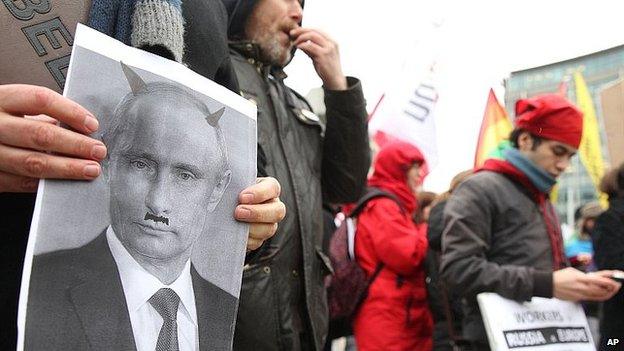Authors denounce 'choking' Russian laws
- Published

Gay rights protesters took to the streets on Wednesday to criticise Russian President Vladimir Putin
More than 200 leading authors including Salman Rushdie, Margaret Atwood and Jonathan Franzen have condemned Russia's anti-gay and blasphemy laws as a "chokehold" on creativity.
In an open letter in the UK's Guardian newspaper, external, they said recent legislation in Russia "put writers at risk".
It comes a day before the opening of the Winter Olympics in the southern Russian resort of Sochi.
A new Russian law bans the promotion of "non-traditional" sexuality to minors.
Critics say the law's loose wording and free interpretation by the authorities is effectively an attack on gay rights.
Last year, Russia also passed a law allowing jail sentences for "offending religious feelings".
In their open letter, the authors said three Russian laws specifically put writers at risk - the gay propaganda and blasphemy laws and the recriminalisation of defamation.
"As writers and artists, we cannot stand quietly by as we watch our fellow writers and journalists pressed into silence or risking prosecution and often drastic punishment for the mere act of communicating their thoughts," the letter said.
"A healthy democracy must hear the independent voices of all its citizens; the global community needs to hear, and be enriched by, the diversity of Russian opinion.
'Deeply worrying'
"We therefore urge the Russian authorities to repeal these laws that strangle free speech."
Those who signed the letter included four Nobel laureates - Gunter Grass, Wole Soyinka, Elfriede Jelinek and Orhan Pamuk - as well as other well-known authors including Ian McEwan, Carol Ann Duffy, Julian Barnes and Neil Gaiman.
Salman Rushdie told the Guardian that the campaign was "incredibly important to Russian writers, artists and citizens alike".
"The chokehold that the Russian Federation has placed on freedom of expression is deeply worrying and needs to be addressed in order to bring about a healthy democracy in Russia," he said.
On Wednesday, gay rights activists staged protests against the Russian government in 19 cities across the world.
They appealed to sponsors of the Winter Olympics to speak out over the anti-gay legislation.
Despite the furore, Russian President Vladimir Putin has defended the new laws and insisted he is not prejudiced against homosexuals.
- Published5 February 2014
- Published27 January 2014
- Published17 January 2014
- Attribution
- Published11 December 2013
- Published12 August 2013